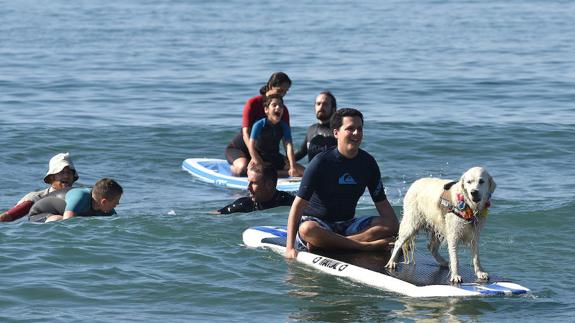Riding the waves, with special assistance
Children with special needs are learning adapted surfing, an activity which improves their motricity, attention and self-esteem
Mónica Pérez
Lunes, 3 de julio 2017, 13:24
Its quite early in the morning: 9.30am, before the sun becomes too hot. The setting couldnt be better: Cabopino beach, at the foot of the Artola sand dunes, one of the loveliest places on the Marbella coast. At this time of the morning the first youngsters arrive with their fathers, mothers and monitors. They carry surfboards, and are wearing wetsuits.
They are accompanied by Balu, a dog who is trained in assisted therapy and who takes part in this activity, which is part therapy and part entertainment. Every Saturday for the past few weeks, they have been spending a couple of hours surfing the waves, thanks to an agreement between the Balus Adapted Surfing Association in Marbella a non-profit-making organisation which has just begun operating in the municipality - and the Centre of Attention for Children with Disabilities (CADI), which is also based in the town.
We havent been going for long but the results are excellent so far, says María Ronisch, the president of Balus. She is a child educationalist, canine trainer, technician in assisted therapy using dogs, and a surfing monitor, who has successfully combined her principal passions in this initiative: surfing, people with disabilities and her dog, Balu.
The day begins with a warm-up session on the sand, which includes balancing games which are adapted to the needs of the group. After that, the activity continues in the water. Balu is present at all times. He sets an example, giving the children more confidence and even getting on the boards with them. Hes a surfer just like they are, explains María.
The activity, which lasts from 9.30 to 11am, never fails to surprise other people who arrive for a day on the beach. We have been coming here for the past few weeks, and its lovely to watch them. They have so much fun, says Marian Campos, who lives in Las Chapas.
This is an exciting water sport, and having contact with the dog gives excellent results. It improves aspects like their motricity, interpersonal relations, self-perception and self-esteem, explains María.
An increasing number of parents have become interested in their child joining in with this activity, which at present doesnt cost anything. Their names are added to the list and a schedule is then drawn up.
Some of the children who come to the beach every weekend suffer from some type of paralysis, are autistic or have a rare illness.
Adapted surfing helps people with different needs to integrate and overcome difficulties, says María. The physical exercise has been shown to have a positive effect, such as heightening self-esteem, increasing the sensation of control, improving self-confidence and mental function, she explains.
"I gradually realised Balu's potential as a therapy dog"
-
Balus Adapted Surfing Association began four years ago, when María Ronisch took a training course to become a surfing monitor. She came into contact with the Kind Surf NGO and the Solo Surf Association in Cadiz, which have for some time been teaching surfing to children with special educational needs.
-
María was already qualified in Child Education and Canine Training, and she decided to combine all her expertise and specialise in therapies assisted by dogs.
-
In 2013 we began to collaborate with the two associations in Cadiz and for the past two years we have been preparing to set up this project in Marbella. We did it a bit at a time in our spare time, and when we had the resources, she says.
-
Balu had come into her life in 2010. He was given to her by friends as a gift and since then he has been her constant companion not only in her everyday life, but also in her profession. As we got to know each other better, I gradually realised his potential as a therapy dog, she says.
Working on emotions
Karina Milici, the president of CADI, stresses that with this type of activity, the youngsters learn from an experience. Emotions come into play in surfing, like in any other sport.
On a physical level, she adds, their balance improves in terms of sensory problems. Just the balancing, the fast movement, the water, the cold, the slippery board, make the body become more aware of postures and breathing, and they also awaken many emotions.
Three monitors from the two associations accompany each of the boys and girls while they are on their surfboards in the water. Marbella Swimming Club also lends a hand with this initiative, for which the associations have already applied for any grants and subsidies which might be available.
The parents, some on the beach and others in the water, also enjoy watching Balu, who never fails to entertain.
Some of the children didnt like dogs when they started doing this, but we have worked with their fears and now they are happy to do the exercises with him, says María.
Eugenia Borlengui, one of the monitors, says the children relax during and after the exercise. They really have a lot of fun doing this, but it also helps to calm them down, she says.
When the time is up, the youngsters prepare to go home. The beach is already filling up with visitors and other surfers are taking to the water. In view of the success of this project so far, and the increasing demand, the associations are hoping to be able to organise the activity on a weekday, as well as on Saturdays, in the near future.
